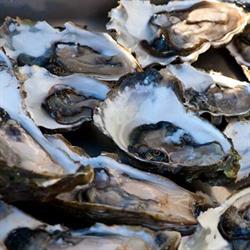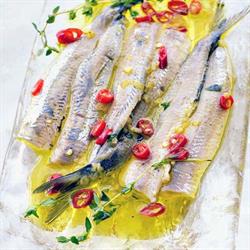As the world tackles the coronavirus pandemic the oceans continue to face unprecedented pressure from overfishing, climate change and plastic pollution.
1. Use tinned sustainable fish
.tmb-thumb250.jpg?sfvrsn=addbc2db_1) Tinned (canned) fish is one of the tastiest, healthiest and most convenient foods in your cupboard.
Tinned (canned) fish is one of the tastiest, healthiest and most convenient foods in your cupboard.
The variety of recipes you can make from this staple is amazing, from sardine masala to smoked herring lentils to couscous tuna salad.
Keep it sustainable by using tinned fish with the MSC blue label which ensures it comes from healthy, sustainable populations, has been caught in a way which minimises environmental impact and comes from effectively managed fisheries.
MSC certified tinned sardines, salmon and herring are available worldwide in leading supermarkets such as Walmart, Aldi and Carrefour, although you might find some hidden in the depths of your kitchen cupboards already.
2. Buy fish from local fishmongers who can deliver sustainable seafood to your door
 Our fragile coastal communities are being severely impacted by coronavirus. Fishers in some countries are struggling to find buyers for their catch as exports and restaurant demand fall.
Our fragile coastal communities are being severely impacted by coronavirus. Fishers in some countries are struggling to find buyers for their catch as exports and restaurant demand fall.
”Fish to your door” schemes have been developed in some parts of the world, selling locally caught seafood originally destined for high-end restaurants, directly to your driveway - contact-free, of course!
Check out the #FishToYourDoor campaign in Cornwall, UK. Perhaps something similar is happening where you live.
3. Fin-to-tail cooking
.tmb-thumb250.jpg?sfvrsn=e3c91abf_1) Sustainability is not only about how fish are caught, it’s also about minimising waste. Fish heads, which are often discarded, make a delicious curry. In fact, fish-head curry is a family favourite in Malaysian and Singaporean households.
Sustainability is not only about how fish are caught, it’s also about minimising waste. Fish heads, which are often discarded, make a delicious curry. In fact, fish-head curry is a family favourite in Malaysian and Singaporean households.
Fish bones can be used to make a tasty stock and scraps can be used to make dips and sauces. If you’re brave enough, even eyeballs can be made into delicious morsels. Josh Niland, Australian chef and restaurant owner, turns them into chips in The Whole Fish Cookbook.
If this doesn’t sound like your thing, try fish with edible bones like anchovies, sardines, sprats and smelt. Crispy fried sprats dipped in aioli make a perfect snack.
4. Sustainable dogs and cats
 It’s not only humans who can eat sustainable seafood, your pets can too. You can find the blue MSC label on products by Purina, Sheba and several other pet food brands.
It’s not only humans who can eat sustainable seafood, your pets can too. You can find the blue MSC label on products by Purina, Sheba and several other pet food brands.
Alternatively, if you are just in need of a dog-fix during these difficult times, take a look at @woofs.co.uk on Instagram for happy dogs enjoying sustainable fishy treats!
5. Try sustainable seafood recipes like my zesty tinned fish
 In the UK, pilchards, now re-branded as Cornish sardines, were a throwback staple popular with most of our grandparents. Pilchard’s were typically served on toast with the tomato sauce they are canned with.
In the UK, pilchards, now re-branded as Cornish sardines, were a throwback staple popular with most of our grandparents. Pilchard’s were typically served on toast with the tomato sauce they are canned with. A more modern, exciting way to enjoy them is with my zesty tinned fish recipe. You can really freshen things up by dousing the fish with half a lemon, a good glug of olive oil and some fresh herbs. It’s a super easy dish and tastes amazing every time.

